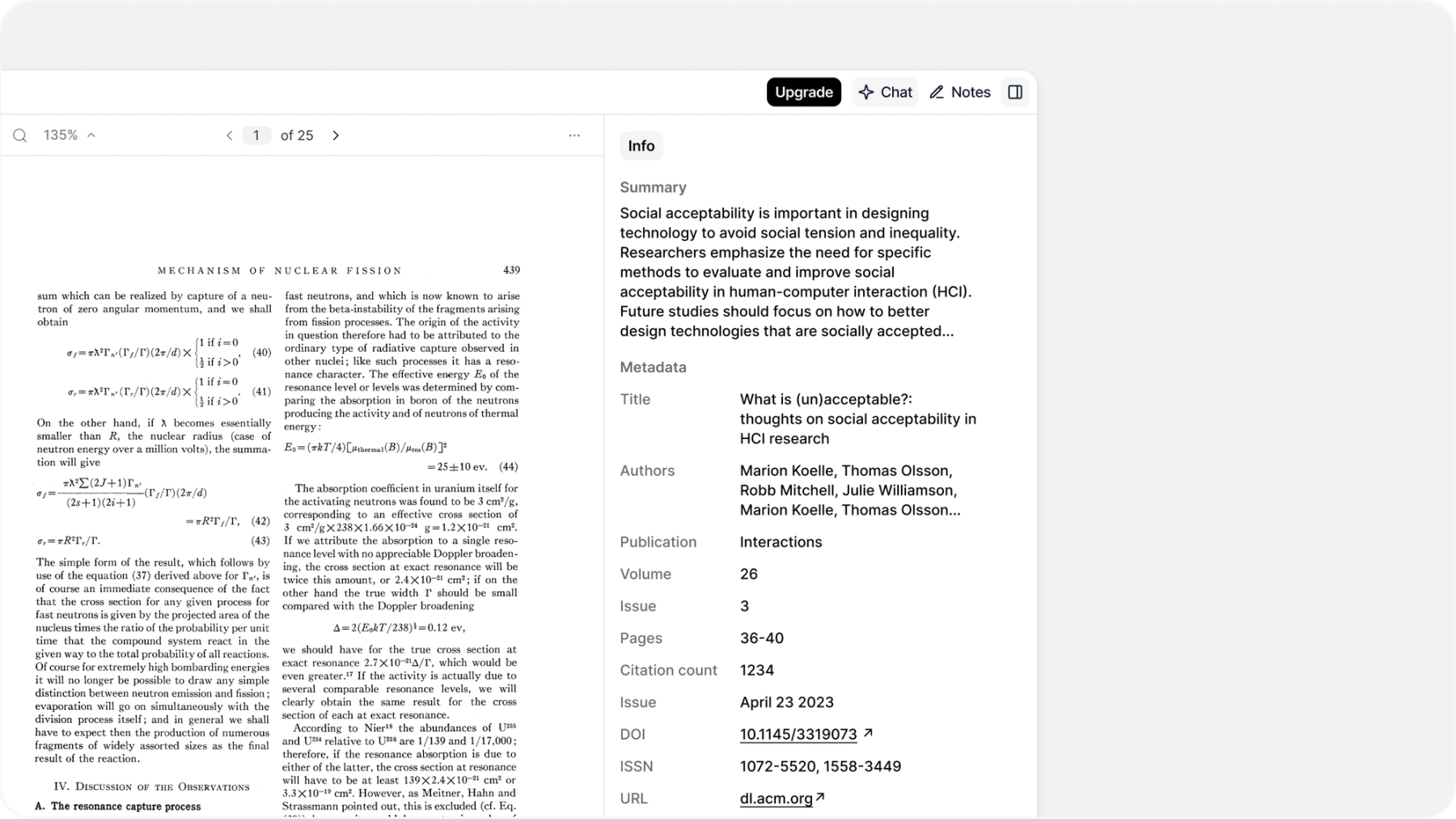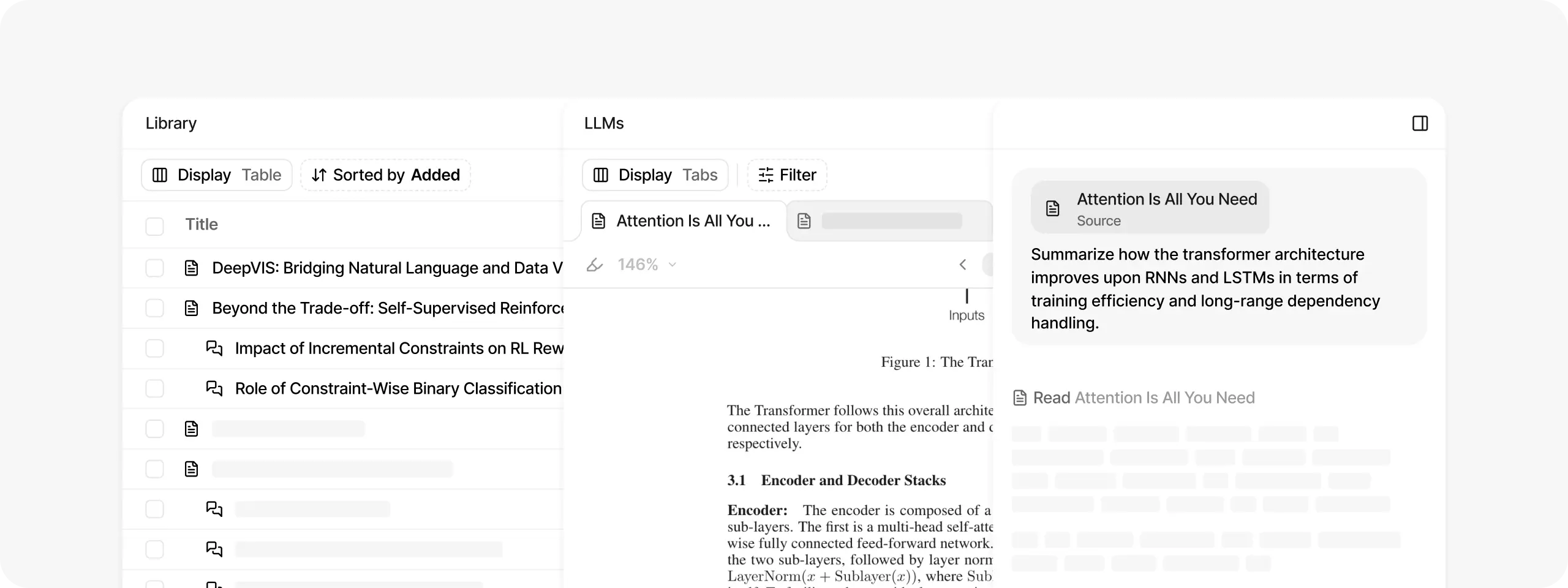The 10 Best AI Citation Generator Tools in 2025
Tired of AI citation generators that create fake sources, butcher formatting, or can't handle podcasts and social media? You're not alone. Most tools struggle with inconsistent citation styles, generate incorrect metadata, and lack collaboration features. Worse, many can't import/export with Zotero or handle emerging source types like AI-generated content.
In this guide, we'll explore 10 AI citation tools that actually work, comparing their accuracy, features, and real-world performance to help you choose the right solution.
1. Anara (formerly Unriddle)
Anara is AI generator tool that shows AI confidence levels for each citation while supporting end-to-end research workflows from AI document analysis to team collaboration.
It analyzes documents using NLP to extract metadata, cross-references academic databases, and provides confidence ratings for citation reliability. It offers AI generated summaries verification through interactive source highlighting.

Key strengths
- Confidence levels show how certain the AI is about each citation
- Zotero integration with group collections and enhanced PDF scanning
- Real-time team collaboration with shared libraries
- Supports MLA, APA, IEEE, Chicago with proper formatting
- Interactive hover previews of source content
How it's for?
Research teams, graduate students, and academics who need citation transparency and collaboration features.
Pricing
- Free plan available
- $12/month individual on yearly plans
- $18/month teams on yearly plans
Ready to test drive advanced citation features?
Get Anara free2. Scite AI
Scite AI goes beyond citation generation to analyze whether sources actually support or contradict your arguments, which is considered crucial for academic integrity.
This AI research tool analyzes 1.3+ billion citation statements across 187M articles using deep learning to classify whether citations support, contradict, or merely mention referenced work.
Key strengths
- Smart Citations show if sources support or contradict claims
- Massive database of 187M+ academic articles
- Citation context analysis prevents misrepresentation
- Research credibility verification
Limitations
- Might be an overkill for basic student assignments
- Focuses on analysis rather than citation generation
Who it's for?
Researchers conducting systematic reviews, academics verifying source credibility, graduate students in empirical fields. might not be the best AI citation maker for undergraduate homework, non-academic writing, or when you just need quick formatting.
Pricing
- $20/month with institutional options
3. QuillBot
QuillBot is an Ai reference generator that supports 1000+ citation styles with a generous free tier—ideal research tool for students who need variety without cost.
To generate reference, QuillBot's AI processes URLs, DOIs, and metadata andextract bibliographic information. Then, it applies formatting rules for different citation styles using machine learning.
Key strengths
- 1000+ citation styles (most comprehensive)
- Robust free tier for basic needs
- Integration with QuillBot's writing tools
- Simple, student-friendly interface
Limitations
- Basic metadata extraction compared to other academic citation generator tools
- Limited collaboration features
- No source verification or confidence indicators
Who it's for?
Undergraduate students, high school students, anyone needing quick formatting across multiple citation styles.
Pricing
- Free tier available
- $9.95/month premium
4. Zotero
While Zotero itself doesn't have AI features, it's the most reliable reference management tool. You can easily connect Zotero to GPTs when you need it.
Simply import your entire Zotero library into AI tools like Anara to get AI-powered citation and analysis while keeping your proven organizational system.
Key strengths
- Free and open-source with proven reliability
- Excellent organization and sync across devices
- Strong collaboration features for research teams
- Easy export to AI citation tools when needed
- No vendor lock-in or subscription dependencies
Limitations
- No AI features built-in
- Manual citation formatting required
- Requires separate AI tools for advanced analysis
Best for
Researchers who prefer proven, traditional workflows but want the option to connect with AI tools like ChatGPT through platforms like Anara when needed.
Pricing
- Free with premium storage options
5. Elicit
Elicit automates systematic literature reviews with AI by finding papers, extracting data, and generating AI citations, saving researchers weeks of manual work.
Elicit searches 125 million papers, extracts relevant information based on research questions, and automatically generates structured findings with proper citations.
Key strengths
- Systematic review automation
- Research question-based paper discovery
- Structured data extraction across studies
- Academic-quality methodology
Limitations
- Works best for empirical research and some users mention poor performance in humanities or theoretical domains
Who it's for?
This AI for citation is helpful for conducting systematic reviews, meta-analyses, evidence-based policy work. However, there are better AI reference generators for creative writing, opinion pieces, theoretical research, or simple homework assignments.
Pricing
- $10-42/month based on usage
6. Scribbr
Scribbr offers expert-verified citation formats with extensive educational resources that prioritizes accuracy of AI citations over speed. The platform also teaches proper citation practices alongside using AI for citation.
The AI analyzes source information then applies expert-verified formatting rules, with additional human review for complex cases.
Key strengths
- Expert verification ensures accuracy
- Comprehensive educational content
- Free core features
- Chrome extension for quick access
Limitations
- Slower than fully automated AI citation generators due to human verification
Who it's for?
- Students prioritizing accuracy, academic institutions with high standards, anyone learning proper citation practices.
Pricing
- Free with paid premium services
7. Consensus
AI citation generation is part of Consensus suite of tools that streamline the research and citation process. It provides consensus findings from multiple studies with automatic citations, making it ideal for evidence-based arguments.
Consensus uses large language models to analyze scientific papers, synthesize findings across studies, and provide evidence-based answers with peer-reviewed citations.
Key strengths
- Consensus analysis across multiple studies
- Evidence-based answer synthesis
- Peer-reviewed source verification
- Scientific accuracy focus
Limitations
- No collaboration features
- Basic citation formatting options
Who it's for?
- Healthcare professionals, policy researchers, scientists needing evidence synthesis.
Pricing
- Free tier
- $9/month premium
8. Paperpal
Paperpal combines AI citation generation with academic writing assistance and translation—perfect for international researchers.
Its AI searches 250+ million research articles to find sources, formats citations, and provides writing suggestions with integrated translation for 30+ languages.
Key strengths
- Translation support for 30+ languages
- Academic writing assistance alongside citations
- 250M+ research article database
- Publisher partnerships for credibility
Limitations
- More expensive than basic AI citation tools
- Overwhelming interface for simple tasks
Who it's for?
International researchers, PhD students writing in English as second language, academics needing writing support.
Pricing
- $19/month with free tier
Related: How to use ChatGPT for academic writing without compromising quality?
9. Mendeley
Mendeley uses AI-driven features to simplify citation generation and management. It uses AI to extract bibliographic data and format citations while enabling reference sharing and research discovery through academic networks. It used to be one of the main Zotero alternatives for reference management.
Key strengths
- Academic social networking integration
- Collaborative reference sharing
- Research discovery recommendations
- Microsoft Word integration
Limitations
- Basic AI citation features compared to specialized tools
Who it's for?
- Academic teams, researchers seeking collaboration, users already in Mendeley ecosystem.
Pricing
- Free with premium features
10. MyBib
MyBib AI is best for simple and quick citations and it will serve well for those who don't need advanced AI referencing features to complicate the process.
MyBib processes URLs, DOIs, and ISBNs to automatically extract and format citations with minimal user input.
Key strengths
- Extremely simple interface
- Fast citation generation
- Free access to basic features
- No learning curve
Limitations
- Very basic features
Who it's for?
- High school students, casual researchers, anyone needing occasional quick citations.
Pricing
- Free with optional premium features
Common problems with AI citation generators
Accuracy issues
Accuracy varies significantly by tool and source type. Always verify citations, especially for complex sources, as even the best tools can generate incorrect metadata or formatting errors. Always verify:
- Author name spelling and order
- Publication dates and journal titles
- DOI numbers and page ranges
- Citation style compliance
Source type limitations
AI citation tools are trained primarily on traditional academic sources with standard metadata (journals, books, basic websites). Most tools struggle with:
- Social media posts and podcasts
- AI-generated content citations
- Preprints and gray literature
- Multimedia sources with complex metadata
These newer source types either lack consistent metadata structures or don't have established citation standards that AI can follow. When citation style guides themselves are inconsistent or silent on these formats, AI citation tools can't generate reliable citations.
Collaboration friction
Most AI citation tools are designed for individual use. For team collaboration, check if your chosen tool offers features that work with your team's workflow, such as:
- Shared reference libraries
- Version control across team members
- Permission management
- Real-time collaboration
